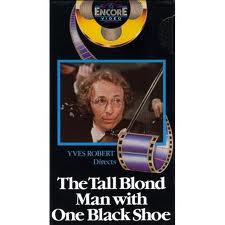
THE TALL BLOND MAN WITH THE ONE BLACK SHOE
France, 1972, 89 Minutes, Colour.
Pierre Richard, Bernard Blier, Jean Rochefort, Mireille Darc, Jean Carmet.
Directed by Yves Robert.
The Tall Blond Man with the One Black Shoe's unusual title is a fair indication of the tone of the film. It is a French comedy, but not too exclusively Gallic in its humour as some films are for our taste. It is quite stylish in its technical
aspects. Featured is Pierre Richard, a generally restrained comedian - the kind who wanders unscathed through misadventures quite oblivious of what is going on. And what is going on is espionage, bugging and the whole range of the techniques of security surveillance. The methods of surveillance are satirised effectively (implying telling comment on the invasion of privacy) and are lampooned quite hilariously. The sequel continues hilariously.
1. The tone of the title, comedy, irony, audience expectations? Was the film a successful comedy? A successful satire with dramatic overtones? What would audiences expect from the title and genre of this film?
2. How particularly French was the film? Aspects of French style? In contrast with British or American treatment?
3. What were the main features of the comedy: the situations, parody, satire, farce, humorous lines and characterization? Which sequences illustrated each of these facets best?
4. How serious were some of the elements underlying the comedy: spying, ambitions, ruthlessness, invasion of privacy? The importance of the final sentence and comment? How serious were these comments?
5. How successfully did the film involve its audience at the beginning: the New York sequences, Milan and his tricks, Toulouse and his counter-tricks?
6. How well did audiences become further involved during the wait at the airport and the choice of the victim? The emergence of the man with the one black shoe? By this stage how well had the film offered serious and comic tones to get audiences on its wavelength?
7. How enjoyable a hero was Francois? was he a hero? An ordinary and comic everyman? How good a comic was he? The background of his life and the explanation from the file, the good aspects of his character, his weaknesses, his fears, his capacity for loving, his puzzle about life, his blithe disregard for dangers around him? How engaging and endearing was the characterization of Francois? In which sequences did he gain audience sympathy best?
8. How well did the film build comic situations around him: his being pursued, his room bugged, the sequence of the searching of his room, his bike-riding, his misinterpretation of the clues, his relationship with Christine, the appearance and disappearance of dead bodies?
9. What comment on officialdom did the film make? What right has officialdom to such espionage and counter-espionage measures?
10. The importance of the guards, the car and bike chases, the inevitable and comic shootings?
11. The atmosphere of death - yet audiences laughing and the wry comment on such deaths, the revealing of the trick to Milan as he died?
12. Was the ending appropriate? The value of love over spying?
13. Was it important for the minor characters to be portrayed as characters or merely sketched in: Toulouse, Milan, the bodyguards, Maurice, Paulette, Christine?
14. Was this a satisfying comedy? Is humorous and satisfying comedy a successful way of communicating to popular audiences about such serious issues as the invasions of privacy?